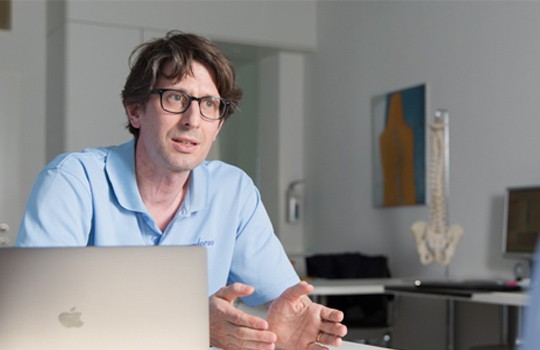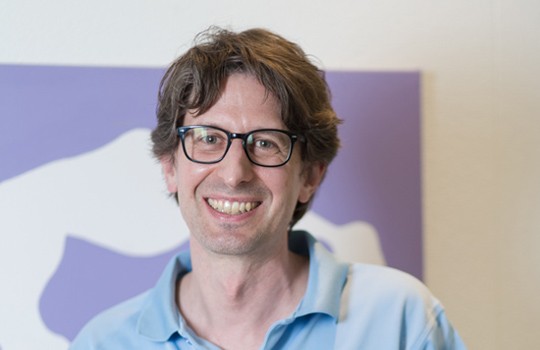eHealth in the doctor’s surgery
Smartphone replaces emergency unit
Digitalisation has arrived at outpatient surgeries, says doctor & industry representative Michael Andor. Patients are already at home in the digital world and generally relaxed about data protection.
Text: Roger Welti, Images: Giorgia Müller, 24 may 2018
Michael Andor, you are a partner in a spinal medical centre in Zurich. To what extent is your daily work digitalised?
We have been digital since we began in 2009. That’s standard practice today when surgeries are founded. Our administration and medical documentation is completely electronic. However, it wasn’t easy to assess the relevant tools and to choose which one to use.
Why was that?
If your documentation and communication is paper-based, you can design it in your own way. Digital tools, on the other hand, allow less flexibility; they standardise processes and limit the individual’s creative possibilities. This optimises the overall system but requires that all participants compromise. In a large team like ours, one digital tool may meet some people’s expectations, while the rest prefer other features. In this case, we have to find a middle ground.
But there was never any doubt about the fundamental decision to digitalise the clinic?
No. A modern practice can no longer be run any other way – and certainly not a group practice. Information about our patients simply has to be accessible for all our colleagues at any time. This enables us to avoid duplication and give patients quicker and better treatment. Also, digitalisation pays off for administrative tasks.

Michael Andor in his clinic in Zurich
Because it frees up resources for medical activities?
Precisely. The fees for administrative activities in practices have been significantly reduced over the years. If electronic tools enable our assistants to spend more time on medical tasks, that’s a substantial economic advantage.
But to do this, you first have to invest in IT. Doesn’t this put off a lot of registered doctors?
IT costs money – it always costs more than was quoted, and maintaining it is also usually more expensive than planned. Furthermore, the tariffs for medical services were defined before IT and its costs had the significance they now have in practices. There is definitely a need for action here. And yet, a modern clinic can no longer be run on the basis of paper documentation. At the latest, doctors realise this when they miss the boat regarding technological developments in invoicing or when they want to hand over their practice.
Aren’t you being a bit optimistic? Faxes and prescription slips are still extremely popular in Swiss surgeries.
Of course, analogue single-partner practices still exist. We often hit a barrier here, even with our digital working methods. If channels from and to other service providers are only analogue, this often hampers efficient working and can lead to loss of information and duplication. But for some general practitioners, the handy prescription slip is, and always has been, the most efficient method of communication.

Specialist for rheumatology, physical medicine and rehabilitation, and member of the Board of Directors of the Zurich Society of Physicians
What do your patients expect? Are they demanding more eHealth in Swiss surgeries?
Young patients can no longer be reached by analogue methods. And even with older generations, the prevalence of smartphones is very high. Our patients are used to communicating by e-mail and with mobile phone cameras, just as they do in other areas of life as well. This is not only convenient but also cost-efficient.
Can you give us a specific example?
A patient sends me a photo of her swollen foot using her mobile phone. Looking at the photo, I may be able to evaluate this case as no cause for alarm and reassure the patient by e-mail, thus saving the costs of unnecessary emergency treatment.
To what extent are patients concerned about data protection?
My personal experience is that they have alarmingly few concerns. There seems to be a kind of change in awareness where people think: “There is so much data circulating about me anyway – let’s at least make sure it benefits me in some way.” For our work, this means that patients are simply glad if all the relevant data is available to us and enables us to provide the best treatment. This does not mean, however, that service providers and insurers should not take data protection very seriously.

Michael Andor is responsible for the eHealth portfolio in the Zurich Society of Physicians.
Talking of “relevant data” – in future, this will be found in the electronic patient dossier (EPD). What is your view on the EPD, and the view of the Zurich Society of Physicians (AGZ)?
In general, and this applies to eHealth as well, we encourage solutions which are accessible, practical and affordable for all. Data protection must be guaranteed. The EPD must fulfil these requirements too.
The EPD is voluntary for registered doctors. Doesn’t that markedly reduce the dossier’s chances of success?
In my opinion, the dual voluntariness will not be a hindrance if the EPD is practical and fundable. Operation from the electronic case history in the practice must be as easy as possible. And the expenses incurred through this must be covered. The limitation of compensation for expenses “in the absence of the patient”, which came into effect at the beginning of 2018, clearly goes in the wrong direction.
Why?
In future, digitalisation will generally mean more work in the absence of patients – i.e. without the patient’s having to come into the practice. This will make treatment cheaper overall. The current tariff intervention by Federal Council member Berset also does not take into account digitalisation in doctors’ surgeries and in patient communication. In my view, it is not the double voluntariness but the correct compensation of the expense which will be crucial for the success of the EPD – if the data are not carefully entered, their quality will not be sufficient for everyday use.
Doctor and industry representative
Michael Andor is a specialist in rheumatology and in physical medicine and rehabilitation. In the Prodorso Centre for Spinal Medicine, founded in 2009, he and around 20 colleagues offer comprehensive healthcare for back and neck problems. Andor is also a member of the board of directors of the Zurich Society of Physicians, which represents around 5,700 qualified doctors in the Zurich canton. On the board of directors, he is responsible for the eHealth portfolio.

Newsletter
Would you like to regularly receive interesting articles and whitepapers on current ICT topics?
More on the topic


